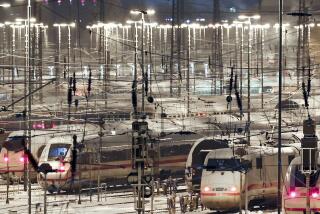German Workers Strike as Labor Unrest Threatens
- Share via
BERLIN — In what many view as a watershed development in Europe’s largest economy, Germany on Friday appeared on the verge of its most serious bout of labor unrest in decades.
Strikes by postal workers in Hamburg and autobahn maintenance employees in Cologne began Friday within hours of the announcement of overwhelming votes for industrial action.
They seemed to be only the first shots in a major battle for higher wages.
The 135,000 members of the Union of German Salaried Employees (DAG) quickly followed Friday with their own strike vote, and leaders of the 2.3-million-strong main public services union, OeTV, were expecting to announce their large pro-strike vote today.
If the proposal receives the required 75% majority required for a strike, OeTV could order an immediate halt to key services such as garbage collection and public transportation in major cities.
It would be the first strike in public services in Germany since 1974.
At the same time, the world’s largest industrial trade union, IG Metall, says it will begin a series of warning strikes in Germany’s pivotal metalworking and auto industries in pursuit of its demand for 9.5% wage increases.
Metalworkers union leader Franz Steinkuehler dismissed the management offer of 3.3% as “a provocation.”
“That offer is not related to reality,” he said.
The level of confrontation on the historically tranquil German labor relations front seems to be part of a major structural adjustment under way in Germany--an adjustment precipitated by the unexpectedly large costs of unification and by a new set of economic conditions prevailing in the country in the wake of the Cold War.
Chancellor Helmut Kohl, desperately trying to contain ballooning budget deficits and rising inflation, is basically saying that, at least for the short term, the kind of settlements that have given the German worker the industrialized world’s highest wages, shortest work week and longest vacations must end.
He has decided to take an unusually tough stand against the public services union, first rejecting its opening demand of a 9.5% wage increase, then refusing to accept a compromise 5.4% settlement proposed by an independent arbitrator.
In a long statement issued Thursday, Interior Minister Rudolf Seiters urged the public services unions to accept the government’s final offer of 4.8%, saying that anything more would slow the economic recovery in the former communist eastern part of the country and threaten overall economic stability.
As a gesture to win public support for his position, Kohl announced Thursday that he and members of his Cabinet would take immediate 5% salary cuts to assist in the drive to contain public spending.
In addition to billions of dollars in new aid commitments to the former communist countries of Eastern Europe, Germany is expected to spend about $125 billion on the reconstruction of the eastern part of the country this year alone.
Trade union leaders, however, reject accusations that they are greedy in their demands and argue that the Kohl government has singled them out as an easy way to save money after its own policy failures.
“What about getting some of the billions that industry has saved up for investment (in the east) and hasn’t spent yet?” asked Birgit Boehret, spokeswoman for the German Trade Union Federation in Duesseldorf.
More to Read
Sign up for Essential California
The most important California stories and recommendations in your inbox every morning.
You may occasionally receive promotional content from the Los Angeles Times.













